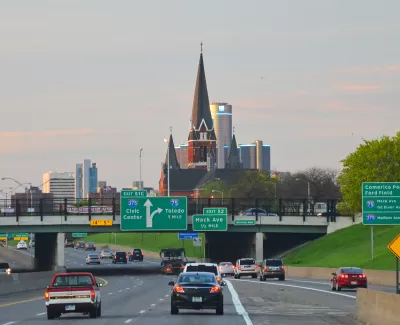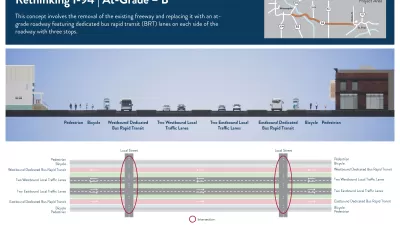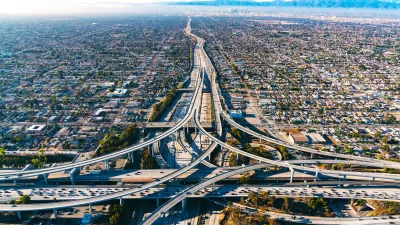A decade-old plan to elevate a below-grade segment of Interstate 375 and replace it with a lower-speed boulevard could begin two years ahead of schedule thanks to USDOT funding.

Detroit’s plan to remove a portion of the I-375 freeway received a boost from the federal government with a $104 million grant from the U.S. Department of Transportation, part of a broader federal endeavor to remedy the impacts of freeways and urban renewal on neighborhoods around the country. Notably, the grant was not awarded from the Reconnecting Communities Act, but from USDOT’s Infrastructure for Rebuilding America program.
According to a Detroit News article by Melissa Nann Burke and Riley Beggin, “The grant is a significant boon for the proposal, which dates to 2013 and envisions a walkable, leafy concourse integrated with the community and lined with shops, restaurants, homes and pedestrians on the eastern of edge of downtown Detroit.”
The effort is expected to cost $300 million and be completed by 2030. “The project, which already has environmental approvals from the Federal Highway Administration, would raise the roadway by 20 feet to street level, integrate it with cross-streets and landscape a boulevard past Jefferson Avenue down to Atwater Street.”
The freeway removal encompasses other projects including traffic calming measures, the removal of fifteen bridges, and new signalized crosswalks and bike lanes.
FULL STORY: Michigan gets $105M grant from feds to turn I-375 in Detroit into boulevard

Planetizen Federal Action Tracker
A weekly monitor of how Trump’s orders and actions are impacting planners and planning in America.

Map: Where Senate Republicans Want to Sell Your Public Lands
For public land advocates, the Senate Republicans’ proposal to sell millions of acres of public land in the West is “the biggest fight of their careers.”

Restaurant Patios Were a Pandemic Win — Why Were They so Hard to Keep?
Social distancing requirements and changes in travel patterns prompted cities to pilot new uses for street and sidewalk space. Then it got complicated.

Platform Pilsner: Vancouver Transit Agency Releases... a Beer?
TransLink will receive a portion of every sale of the four-pack.

Toronto Weighs Cheaper Transit, Parking Hikes for Major Events
Special event rates would take effect during large festivals, sports games and concerts to ‘discourage driving, manage congestion and free up space for transit.”

Berlin to Consider Car-Free Zone Larger Than Manhattan
The area bound by the 22-mile Ringbahn would still allow 12 uses of a private automobile per year per person, and several other exemptions.
Urban Design for Planners 1: Software Tools
This six-course series explores essential urban design concepts using open source software and equips planners with the tools they need to participate fully in the urban design process.
Planning for Universal Design
Learn the tools for implementing Universal Design in planning regulations.
Heyer Gruel & Associates PA
JM Goldson LLC
Custer County Colorado
City of Camden Redevelopment Agency
City of Astoria
Transportation Research & Education Center (TREC) at Portland State University
Camden Redevelopment Agency
City of Claremont
Municipality of Princeton (NJ)





























